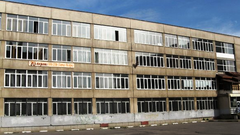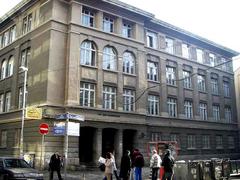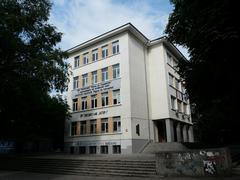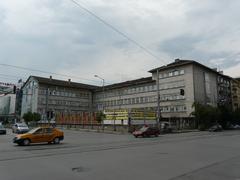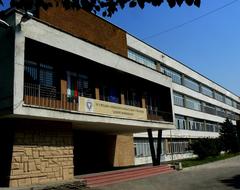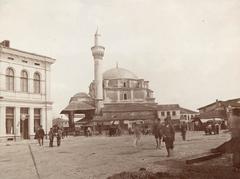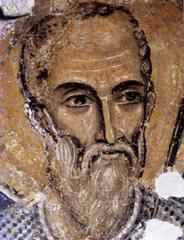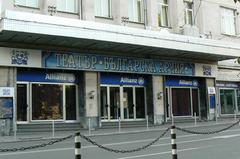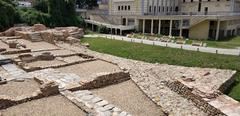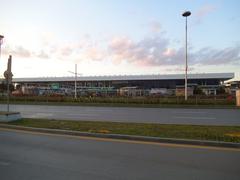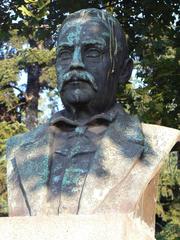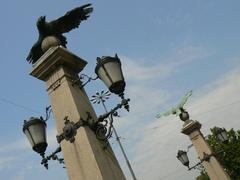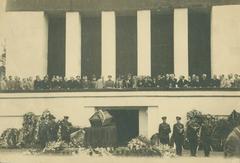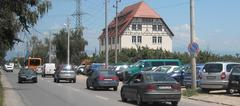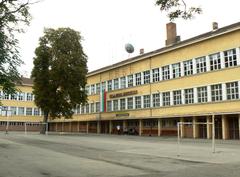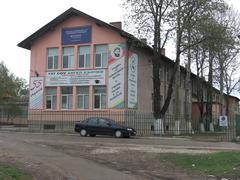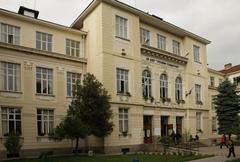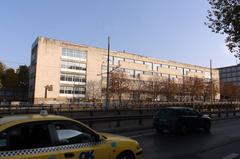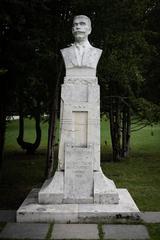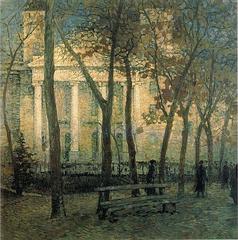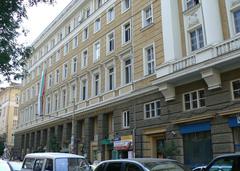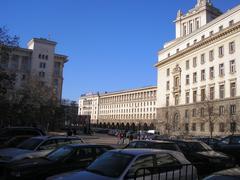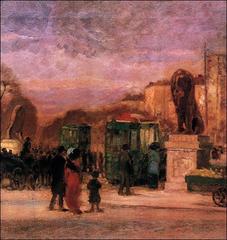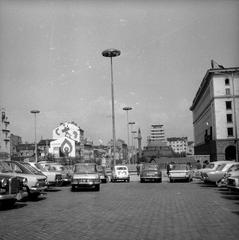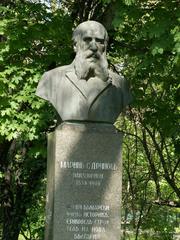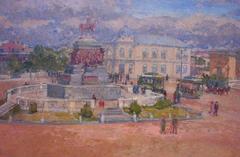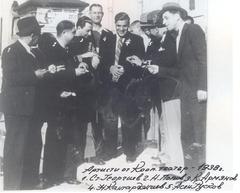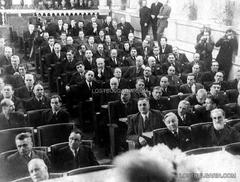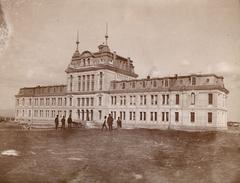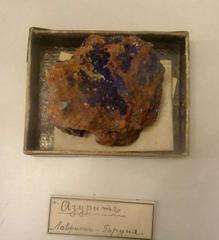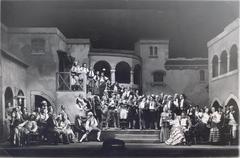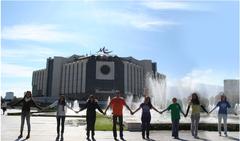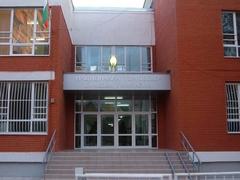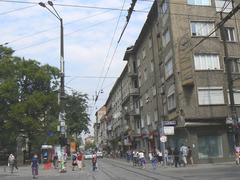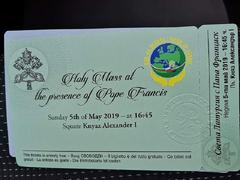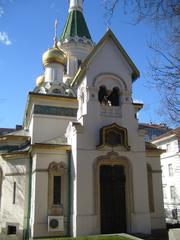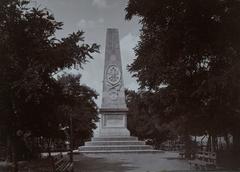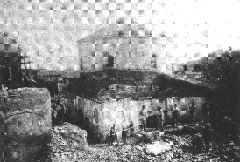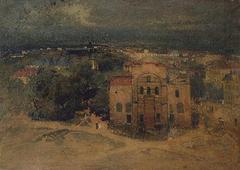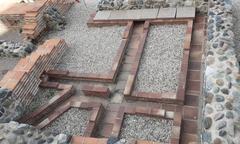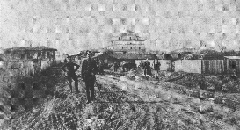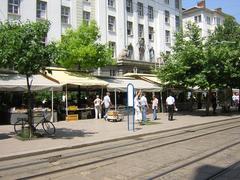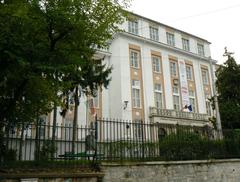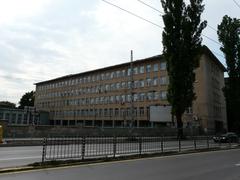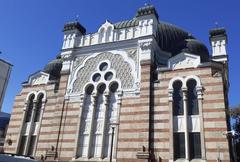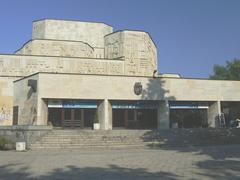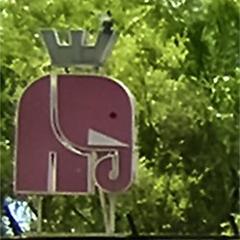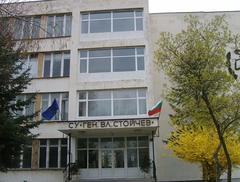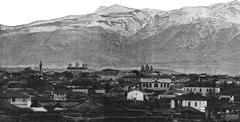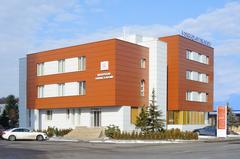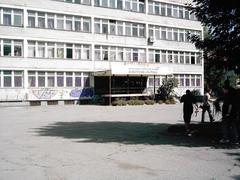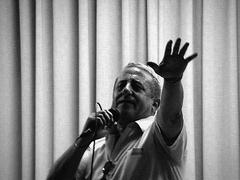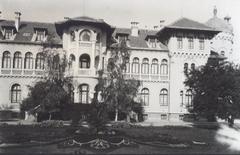
Aleksandrovska University Hospital Sofia Visiting Hours, Tickets, and Guide
Date: 03/07/2025
Introduction: Why Visit Aleksandrovska University Hospital in Sofia?
Aleksandrovska University Hospital, located in the vibrant heart of Sofia, Bulgaria, stands as the nation’s oldest and largest university hospital. Established in the late 19th century, it embodies Bulgaria’s transition to modern medicine after liberation from Ottoman rule, and remains a beacon of medical education, research, and cultural heritage (Wikidata). This guide provides an in-depth look at the hospital’s history, significance, practical visitor information, and how it fits into Sofia’s broader tapestry of historical and cultural landmarks (MetabERN, Aleksandrovska University Hospital: A Historic Landmark in Sofia’s Medical Heritage).
Table of Contents
- Founding and Early Development
- Role in Bulgarian Medical Education
- Specialized Medical Services and Achievements
- Collaboration and Public Health Impact
- Architectural and Cultural Significance
- Visitor Information
- Frequently Asked Questions (FAQ)
- Aleksandrovska Monument: Visitor Guide
- Summary and Traveler Tips
- References
Founding and Early Development
Aleksandrovska University Hospital was founded in the late 19th century at 1 Sveti Georgi Sofiiski Street, Sofia, in the wake of Bulgaria’s liberation from Ottoman rule in 1878. Named to honor Russian Emperor Alexander II, the hospital symbolized gratitude for his role in Bulgaria’s independence and marked a pivotal step toward Western-style medical care in the country (Wikidata). Its establishment was part of Bulgaria’s broader effort to build its healthcare infrastructure and train local professionals, setting the foundation for generations of medical advancement.
Role in Bulgarian Medical Education
Affiliated with Sofia University’s Faculty of Medicine, Aleksandrovska University Hospital has been central to Bulgaria’s medical education for over a century. It serves as the primary teaching hospital, where medical students, interns, and residents receive practical training and exposure to advanced clinical care. The hospital is also a hub for research, regularly hosting international workshops and symposiums, such as those focusing on the intersection of physics and brain metabolism (MetabERN). The faculty’s active participation in research and policy helps shape Bulgarian healthcare standards.
Specialized Medical Services and Achievements
Aleksandrovska is a national leader in the diagnosis and management of rare neuromuscular and metabolic diseases. Its Expert Center for Hereditary Neurologic and Metabolic Disorders, in collaboration with the Bulgarian Neuromuscular Disorder Society, provides comprehensive, multidisciplinary care for conditions like Pompe disease and Niemann-Pick C. Since 2014, specialized respiratory and cardiac care programs have enhanced patient outcomes. The hospital’s ongoing research and clinical trials contribute significantly to advancements in Bulgarian healthcare (MetabERN).
Collaboration and Public Health Impact
Aleksandrovska actively participates in national registries and screening programs for rare diseases, supporting early diagnosis and informed healthcare policy. As a member of the European Reference Network for Rare Hereditary Metabolic Disorders, the hospital sets standards for care and research, while its Commission for Treatment of Rare Disorders coordinates complex patient management at a national level.
The hospital’s role in education and professional development influences health policy and clinical practice across Bulgaria. Its faculty advise government agencies and help develop national healthcare guidelines.
Architectural and Cultural Significance
The campus of Aleksandrovska University Hospital is a blend of neoclassical and modernist architecture, reflecting Sofia’s medical and cultural evolution over more than a century. The original buildings from the late 19th and early 20th centuries feature ornate facades and historical plaques, while recent expansions house state-of-the-art medical facilities. The hospital is not only a center for healing and learning but also a symbol of Bulgaria’s resilience, humanitarianism, and architectural heritage (Aleksandrovska University Hospital: A Historic Landmark in Sofia’s Medical Heritage).
Visitor Information
Visiting Hours
- Patient Visits: Generally 10:00 AM – 8:00 PM daily. Department-specific hours may vary; check the official website or call ahead.
- Historic Tours: Monday–Friday, 10:00 AM – 4:00 PM, by appointment through the administrative office.
Tickets and Entry
- No entry fee for hospital visitors or patients’ families.
- Tours of historic areas are free but require prior booking.
Location and Directions
- Address: 1 Sveti Georgi Sofiiski Street (also known as 1 Sv. Georgi Sofiyski Blvd.), central Sofia.
- Transport: Easily accessible via metro (nearest station: “Serdika” on M1/M2), trams 4, 5, 7, and bus lines. Taxis are available; parking is limited but available nearby.
Accessibility
- Ramps, elevators, and accessible restrooms are provided throughout the campus.
- Signage and designated routes support visitors with mobility challenges.
Nearby Attractions
- Alexander Nevsky Cathedral: Iconic Orthodox cathedral.
- National Palace of Culture: Major venue for exhibitions and concerts.
- Borisova Gradina Park: Sofia’s oldest park, ideal for walks.
- National Art Gallery and City Garden: Both within walking distance.
Frequently Asked Questions (FAQ)
Q: What are the hospital’s visiting hours?
A: Typically 10:00 AM to 8:00 PM, but check for department-specific schedules.
Q: Is there an entry fee?
A: No, entry is free for visitors and historic tours. Appointments are recommended for tours.
Q: How do I get there?
A: Central Sofia location; easily reached by metro, bus, tram, or taxi. Limited parking nearby.
Q: Is Aleksandrovska accessible for people with disabilities?
A: Yes, with ramps, elevators, and accessible restrooms.
Q: Are there guided tours available in English?
A: Yes, tours are offered in Bulgarian and English; advance booking is advised.
Aleksandrovska Monument: A Historical Landmark in Sofia
Situated near the hospital, the Aleksandrovska Monument commemorates Bulgaria’s struggle for independence and national identity. It features neoclassical design elements, statues, and plaques, and serves as a focal point for national celebrations.
Visitor Information
- Opening Hours: Open year-round, typically 9:00 AM – 7:00 PM.
- Admission: Free; guided tours available via Sofia City Museum or local agencies.
- Accessibility: Wheelchair accessible, with paved paths and ramps.
- Getting There: Central location, reachable by metro (“Serdika”), trams, and bus lines. Parking is limited.
Special Events and Tips
- National holidays feature ceremonies and cultural events.
- Photography is permitted; the monument is especially photogenic during golden hour.
Summary and Traveler Tips
Aleksandrovska University Hospital represents over a century of Bulgarian medical progress, combining healthcare excellence, academic leadership, and architectural heritage (MetabERN, Aleksandrovska University Hospital: A Historic Landmark in Sofia’s Medical Heritage). Its central location, free visitor access, and proximity to Sofia’s top attractions make it ideal for both medical and cultural exploration. For the latest information, consult the official hospital website and consider digital tools like the Audiala app for enhanced guidance.
Tips:
- Wear comfortable shoes for walking the large campus.
- Photography is allowed in public spaces; please respect patient privacy.
- Use public transport to avoid parking challenges.
- Book tours in advance for the best experience.
References
- Wikidata: Aleksandrovska University Hospital
- MetabERN: University Hospital Aleksandrovska, Sofia
- Aleksandrovska University Hospital: A Historic Landmark in Sofia’s Medical Heritage
- Sofia Tourism
- Sofia Traffic: Public Transport
For more travel tips, events, and guided tours, download the Audiala app or follow us on social media!

